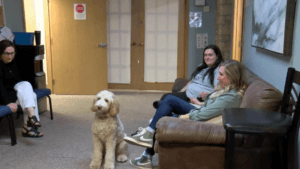Adult & Teen Challenge Introduces Therapy Dog Program
March 8, 2024
| By La Crosse Community Foundation |
ATC Welcomes Four-Legged Staff Member
With a grant from La Crosse Community Foundation, Adult & Teen Challenge of Western Wisconsin is integrating a therapy dog program to support individuals in recovery. Ozzie, an Australian Labradoodle, has been training for his new post since August. He’ll become certified this June and enter full-time service. For now, he’s getting acquainted with ATC guests overcoming addiction.
Studies have shown that therapy dogs like Ozzie reduce anxiety, improve mood, and increase chances of successful recovery. Ozzie will participate in daily activities, offering unconditional love and support to residents and staff alike.
Therapy dogs increase success in recovery
“We have growing data about what happens when therapy dogs are integrated into recovery programs like ours,” said Kevin Schaler, executive director of Adult & Teen Challenge of Western Wisconsin. “Chief among them, participants are more likely to engage in and adhere to treatment programs, which reduces the likelihood of relapse.”
LCF grant covers start-up costs
The La Crosse Community Foundation grant covered the cost of purchasing Ozzie, plus his veterinary needs, training, grooming, and food until he’s certified this summer. Fundraising efforts by Adult & Teen Challenge will cover ongoing costs.
“We’re grateful to all the donors who made this grant possible,” said Jamie Schloegel, CEO of La Crosse Community Foundation. “Helping individuals in recovery fosters a safer, healthier community by reducing healthcare and legal costs, and it strengthens families, diminishes stigma around addiction, and breaks the cycle of substance use disorder for future generations.”
Ozzie was selected for the role because Australian Labradoodles are known to be gentle and highly intelligent and have a remarkable ability to empathize with humans. He’s currently receiving extensive obedience training along with specialized training to sense and respond to emotional distress cues. The training is preparing Ozzie to provide comfort, companionship, and nonjudgmental support to residents to help in the therapeutic process.

